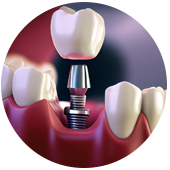- Email: wasidental@yahoo.com
- Shop no 2-3 Aggarwal Plaza RajNagar
- Call: +91 9990381143
Root Canal
Root Canal Treatment and Caps/Crown
Root canal treatment (RCT) and dental crowns (caps) are often used together to restore a damaged or infected tooth, allowing it to function and look natural again. Here’s how each procedure works and why they are commonly paired.
Root Canal Treatment (RCT)
A root canal treatment is performed to save a tooth with infected or damaged pulp (the soft tissue inside the tooth containing nerves and blood vessels). This infection often results from deep decay, repeated dental procedures, or cracks in the tooth, leading to pain, sensitivity, or even abscess formation if left untreated.
The Root Canal Process:
Anesthesia: The area is numbed to ensure
the
procedure is pain-free.
Accessing the Pulp: A small opening is
made in
the tooth to access the infected pulp.
Cleaning and Shaping: The infected or
dead
tissue is removed from the root canals, which
are then cleaned, disinfected, and shaped.
Filling: The cleaned canals are filled
with a
biocompatible material (often gutta-percha) to
seal them and prevent reinfection.
Temporary Filling: A temporary filling is
placed
on top until a crown can be placed for final
restoration.

Dental Crown (Cap)
After a root canal, the tooth is usually weakened, making it more susceptible to fractures. A dental crown, or cap, is used to restore the tooth's strength, protect it from future damage, and improve its appearance.
The Crown Process:
Preparation: The tooth is shaped to make space
for the
crown.
Impression: An impression of the tooth is taken
to
create a custom-fit crown that matches your bite and
tooth structure.
Temporary Crown: A temporary crown may be placed
until
the permanent crown is ready.
Permanent Crown Placement: The permanent crown,
made
from materials like porcelain, ceramic, or metal, is
cemented onto the tooth for durability and aesthetics.
Benefits of Combining RCT and Crowns
Preservation: Together, they preserve a tooth
that would
otherwise need extraction.
Durability: The crown protects the weakened tooth
and
distributes the forces of biting, reducing the risk of
future fractures.
Natural Appearance: Crowns are designed to match
your
natural teeth in color and shape, providing a seamless
look.
Root canal treatment combined with a crown provides a long-term solution for saving and strengthening teeth affected by severe decay or infection.
Resources to Keep You Informed
with Our
Blog

What is a BB glow treatment?
BBglow treatment is a minimally invasive and non-surgical procedure that uses a highly effective tinted pigment, applied by using a nano-needle or microneedle to penetrate the skin.

How long do dental implants last?
The average lifespan of a dental implant is anywhere from 10 -30 years. This means that most likely, depending on your age when you get an implant, it will last for the rest of your life.

What is GFC treatment for skin?
GFC stands for Growth Factor Concentrate therapy. The Growth Factors are extracted from the patient's own blood and are used to stimulate the growth of new skin cells or hair follicles.
How it Helps You to
Keep
Healthy

Get Appointment
+91 99536 87992

Start Check-Up
Begin Your Journey to Better Health Today: Start Your Check-Up!

Enjoy Healthy Life
Embrace Wellness: Enjoy a Healthier Life!
